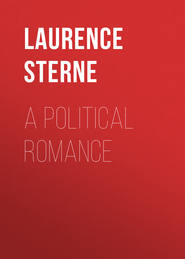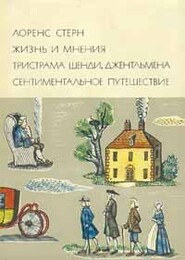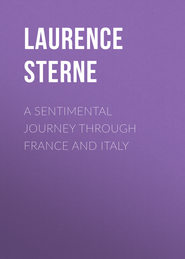По всем вопросам обращайтесь на: info@litportal.ru
(©) 2003-2025.
✖
The Life and Opinions of Tristram Shandy, Gentleman
Настройки чтения
Размер шрифта
Высота строк
Поля
Holla!—you, chairman!—here's sixpence—do step into that bookseller's shop, and call me a day-tall critick. I am very willing to give any one of 'em a crown to help me with his tackling, to get my father and my uncle Toby off the stairs, and to put them to bed.
–'Tis even high time; for except a short nap, which they both got whilst Trim was boring the jack-boots—and which, by-the-bye, did my father no sort of good, upon the score of the bad hinge—they have not else shut their eyes, since nine hours before the time that doctor Slop was led into the back parlour in that dirty pickle by Obadiah.
Was every day of my life to be as busy a day as this—and to take up—Truce.
I will not finish that sentence till I have made an observation upon the strange state of affairs between the reader and myself, just as things stand at present—an observation never applicable before to any one biographical writer since the creation of the world, but to myself—and I believe, will never hold good to any other, until its final destruction—and therefore, for the very novelty of it alone, it must be worth your worships attending to.
I am this month one whole year older than I was this time twelve-month; and having got, as you perceive, almost into the middle of my third volume (According to the preceding Editions.)—and no farther than to my first day's life—'tis demonstrative that I have three hundred and sixty-four days more life to write just now, than when I first set out; so that instead of advancing, as a common writer, in my work with what I have been doing at it—on the contrary, I am just thrown so many volumes back—was every day of my life to be as busy a day as this—And why not?—and the transactions and opinions of it to take up as much description—And for what reason should they be cut short? as at this rate I should just live 364 times faster than I should write—It must follow, an' please your worships, that the more I write, the more I shall have to write—and consequently, the more your worships read, the more your worships will have to read.
Will this be good for your worships eyes?
It will do well for mine; and, was it not that my Opinions will be the death of me, I perceive I shall lead a fine life of it out of this self-same life of mine; or, in other words, shall lead a couple of fine lives together.
As for the proposal of twelve volumes a year, or a volume a month, it no way alters my prospect—write as I will, and rush as I may into the middle of things, as Horace advises—I shall never overtake myself whipp'd and driven to the last pinch; at the worst I shall have one day the start of my pen—and one day is enough for two volumes—and two volumes will be enough for one year.—
Heaven prosper the manufacturers of paper under this propitious reign, which is now opened to us—as I trust its providence will prosper every thing else in it that is taken in hand.
As for the propagation of Geese—I give myself no concern—Nature is all-bountiful—I shall never want tools to work with.
–So then, friend! you have got my father and my uncle Toby off the stairs, and seen them to bed?—And how did you manage it?—You dropp'd a curtain at the stair-foot—I thought you had no other way for it—Here's a crown for your trouble.
Chapter 2.XLIX
—Then reach me my breeches off the chair, said my father to Susannah.—There is not a moment's time to dress you, Sir, cried Susannah—the child is as black in the face as my—As your what? said my father, for like all orators, he was a dear searcher into comparisons.—Bless, me, Sir, said Susannah, the child's in a fit.—And where's Mr. Yorick?—Never where he should be, said Susannah, but his curate's in the dressing-room, with the child upon his arm, waiting for the name—and my mistress bid me run as fast as I could to know, as captain Shandy is the godfather, whether it should not be called after him.
Were one sure, said my father to himself, scratching his eye-brow, that the child was expiring, one might as well compliment my brother Toby as not—and it would be a pity, in such a case, to throw away so great a name as Trismegistus upon him—but he may recover.
No, no,—said my father to Susannah, I'll get up—There is no time, cried Susannah, the child's as black as my shoe. Trismegistus, said my father—But stay—thou art a leaky vessel, Susannah, added my father; canst thou carry Trismegistus in thy head, the length of the gallery without scattering?—Can I? cried Susannah, shutting the door in a huff.—If she can, I'll be shot, said my father, bouncing out of bed in the dark, and groping for his breeches.
Susannah ran with all speed along the gallery.
My father made all possible speed to find his breeches.
Susannah got the start, and kept it—'Tis Tris—something, cried Susannah—There is no christian-name in the world, said the curate, beginning with Tris—but Tristram. Then 'tis Tristram-gistus, quoth Susannah.
–There is no gistus to it, noodle!—'tis my own name, replied the curate, dipping his hand, as he spoke, into the bason—Tristram! said he, &c. &c. &c. &c.—so Tristram was I called, and Tristram shall I be to the day of my death.
My father followed Susannah, with his night-gown across his arm, with nothing more than his breeches on, fastened through haste with but a single button, and that button through haste thrust only half into the button-hole.
–She has not forgot the name, cried my father, half opening the door?—No, no, said the curate, with a tone of intelligence.—And the child is better, cried Susannah.—And how does your mistress? As well, said Susannah, as can be expected.—Pish! said my father, the button of his breeches slipping out of the button-hole—So that whether the interjection was levelled at Susannah, or the button-hole—whether Pish was an interjection of contempt or an interjection of modesty, is a doubt, and must be a doubt till I shall have time to write the three following favourite chapters, that is, my chapter of chamber-maids, my chapter of pishes, and my chapter of button-holes.
All the light I am able to give the reader at present is this, that the moment my father cried Pish! he whisk'd himself about—and with his breeches held up by one hand, and his night-gown thrown across the arm of the other, he turned along the gallery to bed, something slower than he came.
Chapter 2.L
I wish I could write a chapter upon sleep
A fitter occasion could never have presented itself, than what this moment offers, when all the curtains of the family are drawn—the candles put out—and no creature's eyes are open but a single one, for the other has been shut these twenty years, of my mother's nurse.
It is a fine subject.
And yet, as fine as it is, I would undertake to write a dozen chapters upon button-holes, both quicker and with more fame, than a single chapter upon this.
Button-holes! there is something lively in the very idea of 'em—and trust me, when I get amongst 'em—You gentry with great beards—look as grave as you will—I'll make merry work with my button-holes—I shall have 'em all to myself—'tis a maiden subject—I shall run foul of no man's wisdom or fine sayings in it.
But for sleep—I know I shall make nothing of it before I begin—I am no dab at your fine sayings in the first place—and in the next, I cannot for my soul set a grave face upon a bad matter, and tell the world—'tis the refuge of the unfortunate—the enfranchisement of the prisoner—the downy lap of the hopeless, the weary, and the broken-hearted; nor could I set out with a lye in my mouth, by affirming, that of all the soft and delicious functions of our nature, by which the great Author of it, in his bounty, has been pleased to recompence the sufferings wherewith his justice and his good pleasure has wearied us—that this is the chiefest (I know pleasures worth ten of it); or what a happiness it is to man, when the anxieties and passions of the day are over, and he lies down upon his back, that his soul shall be so seated within him, that whichever way she turns her eyes, the heavens shall look calm and sweet above her—no desire—or fear—or doubt that troubles the air, nor any difficulty past, present, or to come, that the imagination may not pass over without offence, in that sweet secession.
'God's blessing,' said Sancho Panca, 'be upon the man who first invented this self-same thing called sleep—it covers a man all over like a cloak.' Now there is more to me in this, and it speaks warmer to my heart and affections, than all the dissertations squeez'd out of the heads of the learned together upon the subject.
–Not that I altogether disapprove of what Montaigne advances upon it—'tis admirable in its way—(I quote by memory.)
The world enjoys other pleasures, says he, as they do that of sleep, without tasting or feeling it as it slips and passes by.—We should study and ruminate upon it, in order to render proper thanks to him who grants it to us.—For this end I cause myself to be disturbed in my sleep, that I may the better and more sensibly relish it.—And yet I see few, says he again, who live with less sleep, when need requires; my body is capable of a firm, but not of a violent and sudden agitation—I evade of late all violent exercises—I am never weary with walking—but from my youth, I never looked to ride upon pavements. I love to lie hard and alone, and even without my wife—This last word may stagger the faith of the world—but remember, 'La Vraisemblance' (as Bayle says in the affair of Liceti) 'n'est pas toujours du Cote de la Verite.' And so much for sleep.
Chapter 2.LI
If my wife will but venture him—brother Toby, Trismegistus shall be dress'd and brought down to us, whilst you and I are getting our breakfasts together.—
–Go, tell Susannah, Obadiah, to step here.
She is run up stairs, answered Obadiah, this very instant, sobbing and crying, and wringing her hands as if her heart would break.
We shall have a rare month of it, said my father, turning his head from Obadiah, and looking wistfully in my uncle Toby's face for some time—we shall have a devilish month of it, brother Toby, said my father, setting his arms a'kimbo, and shaking his head; fire, water, women, wind—brother Toby!—'Tis some misfortune, quoth my uncle Toby.—That it is, cried my father—to have so many jarring elements breaking loose, and riding triumph in every corner of a gentleman's house—Little boots it to the peace of a family, brother Toby, that you and I possess ourselves, and sit here silent and unmoved—whilst such a storm is whistling over our heads.—
And what's the matter, Susannah? They have called the child Tristram—and my mistress is just got out of an hysterick fit about it—No!—'tis not my fault, said Susannah—I told him it was Tristram-gistus.
–Make tea for yourself, brother Toby, said my father, taking down his hat—but how different from the sallies and agitations of voice and members which a common reader would imagine!
–For he spake in the sweetest modulation—and took down his hat with the genteelest movement of limbs, that ever affliction harmonized and attuned together.
–Go to the bowling-green for corporal Trim, said my uncle Toby, speaking to Obadiah, as soon as my father left the room.
Chapter 2.LII
When the misfortune of my Nose fell so heavily upon my father's head;—the reader remembers that he walked instantly up stairs, and cast himself down upon his bed; and from hence, unless he has a great insight into human nature, he will be apt to expect a rotation of the same ascending and descending movements from him, upon this misfortune of my Name;—no.
The different weight, dear Sir—nay even the different package of two vexations of the same weight—makes a very wide difference in our manner of bearing and getting through with them.—It is not half an hour ago, when (in the great hurry and precipitation of a poor devil's writing for daily bread) I threw a fair sheet, which I had just finished, and carefully wrote out, slap into the fire, instead of the foul one.
Instantly I snatch'd off my wig, and threw it perpendicularly, with all imaginable violence, up to the top of the room—indeed I caught it as it fell—but there was an end of the matter; nor do I think any think else in Nature would have given such immediate ease: She, dear Goddess, by an instantaneous impulse, in all provoking cases, determines us to a sally of this or that member—or else she thrusts us into this or that place, or posture of body, we know not why—But mark, madam, we live amongst riddles and mysteries—the most obvious things, which come in our way, have dark sides, which the quickest sight cannot penetrate into; and even the clearest and most exalted understandings amongst us find ourselves puzzled and at a loss in almost every cranny of nature's works: so that this, like a thousand other things, falls out for us in a way, which tho' we cannot reason upon it—yet we find the good of it, may it please your reverences and your worships—and that's enough for us.
Now, my father could not lie down with this affliction for his life—nor could he carry it up stairs like the other—he walked composedly out with it to the fish-pond.
Had my father leaned his head upon his hand, and reasoned an hour which way to have gone—reason, with all her force, could not have directed him to any think like it: there is something, Sir, in fish-ponds—but what it is, I leave to system-builders and fish-pond-diggers betwixt 'em to find out—but there is something, under the first disorderly transport of the humours, so unaccountably becalming in an orderly and a sober walk towards one of them, that I have often wondered that neither Pythagoras, nor Plato, nor Solon, nor Lycurgus, nor Mahomet, nor any one of your noted lawgivers, ever gave order about them.
Chapter 2.LIII
Your honour, said Trim, shutting the parlour-door before he began to speak, has heard, I imagine, of this unlucky accident—O yes, Trim, said my uncle Toby, and it gives me great concern.—I am heartily concerned too, but I hope your honour, replied Trim, will do me the justice to believe, that it was not in the least owing to me.—To thee—Trim?—cried my uncle Toby, looking kindly in his face—'twas Susannah's and the curate's folly betwixt them.—What business could they have together, an' please your honour, in the garden?—In the gallery thou meanest, replied my uncle Toby.
Trim found he was upon a wrong scent, and stopped short with a low bow—Two misfortunes, quoth the corporal to himself, are twice as many at least as are needful to be talked over at one time;—the mischief the cow has done in breaking into the fortifications, may be told his honour hereafter.—Trim's casuistry and address, under the cover of his low bow, prevented all suspicion in my uncle Toby, so he went on with what he had to say to Trim as follows:











